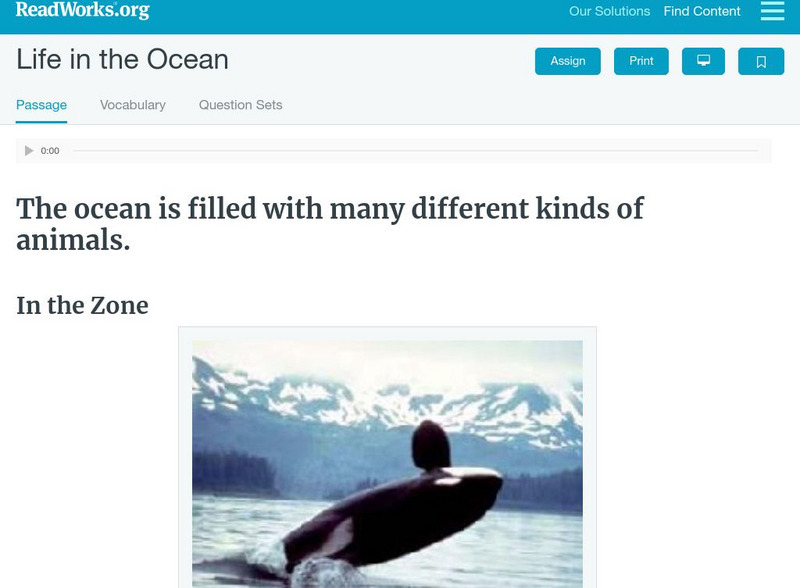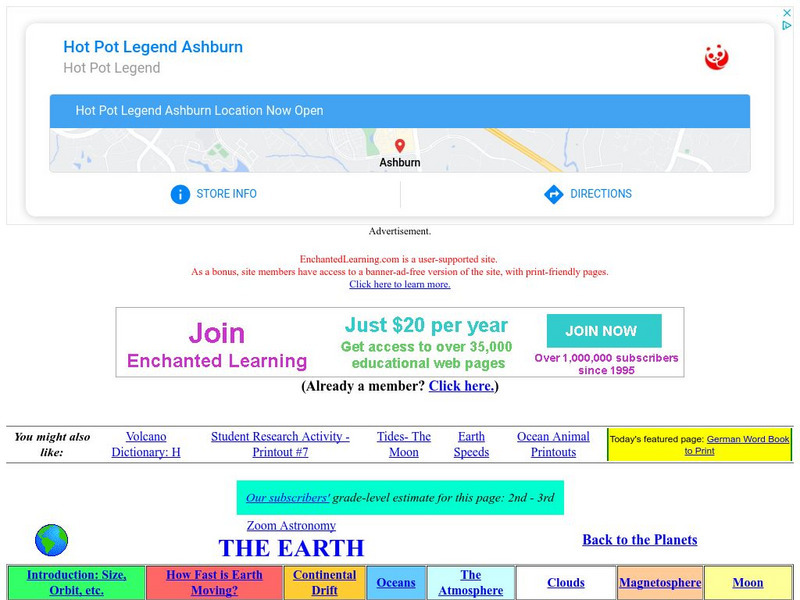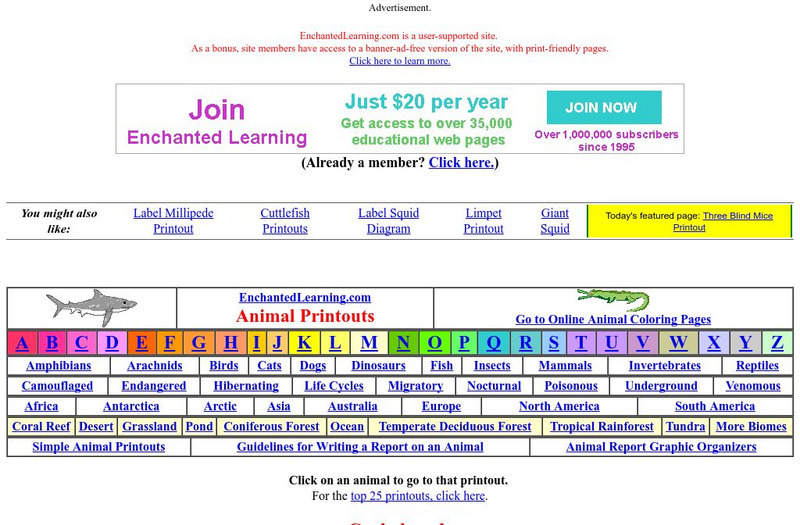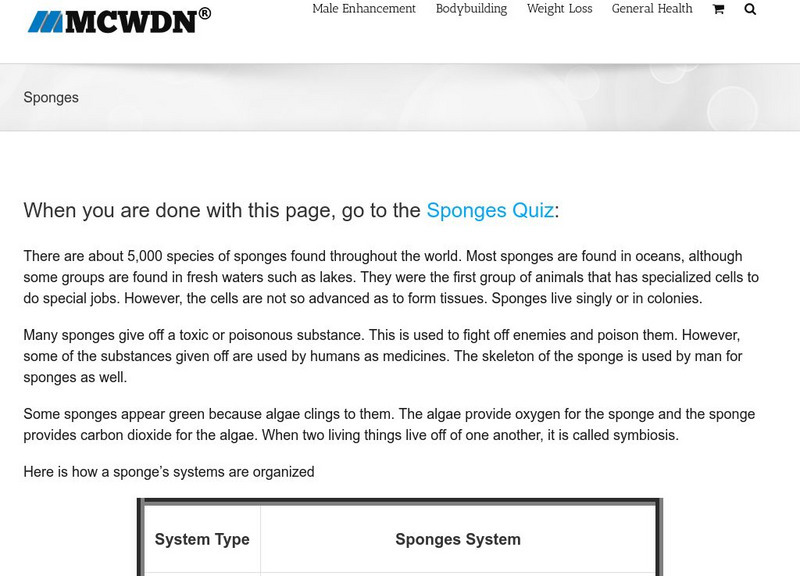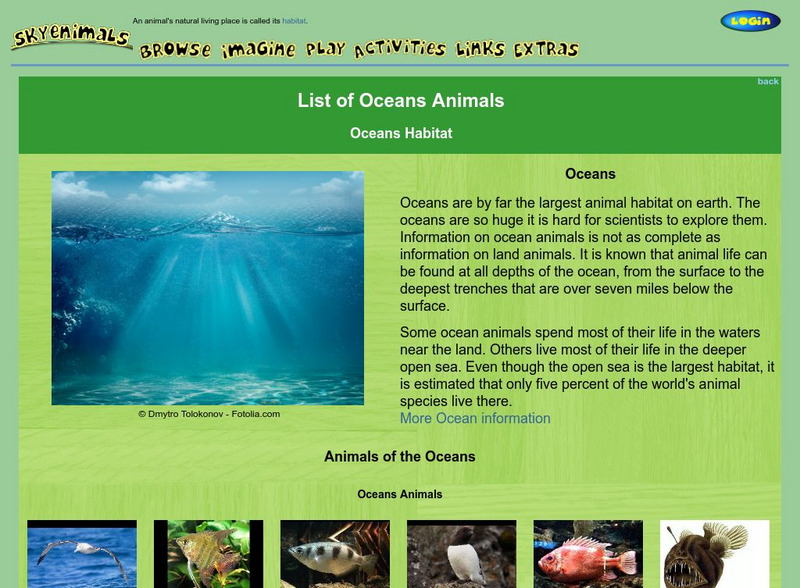Missouri Botanical Garden
Missouri Botanical Garden: Temperate Oceans
This site from the Missouri Botanical Garden is a comprehensive site covering various topics related to temperate oceans. Be sure to check out the ocean animals link on the left side to learn more about the invertebrates that live in the...
TED Talks
Ted: Ted Ed: How Giant Sea Creatures Eat Tiny Sea Creatures
Kelly Benoit-Bird discusses new research that shows large sea animals actually herding their tiny food into big, bitable chunks. [6:22]
PBS
Pbs Kids: Wild Kratts: Capture the Fishmobiles
Utilize Creature Powers to capture as many fish as you can while riding around in the ocean in miniature fish-themed vehicles called Fishmobiles. Can you keep up with the rapid, precise movements of schooling fish?
Kinder Art
Kinder Art: Construct an Artquarium (Lesson Plan)
This lesson plan gives students a chance to create their own underwater animal out of paper-mache, and their imagination. Provides a colorful photo example, assessment criteria, and a suggested book to use for inspiration.
Australian Broadcasting Corporation
Australian Broadcasting Corporation: Oceans Alive: Cool, Wet Facts
Did you know that turtles migrate 1400 miles to lay their eggs? Did you know that penguins swim underwater at 55 MPH? Click on this site to learn more interesting facts.
Australian Broadcasting Corporation
Australian Broadcasting Corporation: Oceans Alive: Whale Dreams
You can click on whale spotting in Australia, types of whales, global whale sanctuary and whale songs. View maps and diagrams that can help you spot whales.
American Museum of Natural History
American Museum of Natural History: Creature Feature
A matching game where students match different ocean creatures to their adaptations for survival.
American Museum of Natural History
American Museum of Natural History: It Takes All Kinds to Make a World
Learn about the biodiversity found in the ocean by looking at examples of marine life.
Read Works
Read Works: Life in the Ocean
[Free Registration/Login Required] An informational text about the different depth levels of the ocean and the types of animals that live in each. A question sheet is available to help students build skills in reading comprehension.
Woods Hole Oceanographic Institution
Woods Hole Oceanography Institute: Adaptations to Light
View several pictures of ocean life through the eyes of scientists and staff at Woods Hole Oceanography Institute. This particular slideshow highlights how ocean creatures change their colors in order to either hide from or frighten...
Other
Nanoos: Satellite Tracking [Pdf]
In this activity, students will be introduced to satellite tracking data. This data allows students to track the movement of marine animals over time. By the end of the activity, students will be able to answer questions related to...
Enchanted Learning
Enchanted Learning: Zoom School: Oceans
Find out why the oceans are blue and what causes waves by clicking here. There is a table of information about the four oceans as well as interesting facts on waves, salinity, and tides.
Enchanted Learning
Enchanted Learning: Cephalopods
This site provides links to elementary information about cephalopods. Students and teachers will find links to the blue ring octopus, the giant squid, the cuttlefish, octopus and more.
Australian Broadcasting Corporation
Australian Broadcasting Corporation: Monsters of the Deep: Tons of Tentacles
Read about octopuses and squids. Learn about their tentacles and other parts of the body.
National Geographic
National Geographic: Your Ocean
This site provides a lesson plan for educators to use when teaching about the Ocean. In addition, there are many other related links and information about the ocean.
Other
Young Ocean Explorers
This amazing website brings the ocean direct to your computer with high-quality, fact-filled videos. Articles answer everything you ever wanted to know about the ocean.
Kidport
Some Animals Live in Rock Caves
This site has brief illustrations and sample locations as to where the tiger, the bear, the moray eel and bat live.
Other
Mcwdn: Sponges
A brief summary about sponges. Included are an organized chart about the body systems in a sponge, links to other websites about sponges, and an online quiz about sponges.
Other
Skyenimals: List of Ocean Animals: Ocean Habitat
Learn about the largest animal habitat on Earth with this website that gives facts and images of the ocean habitat. Site contains pictures and images of ocean animals.
PBS
Pbs Teachers: Ocean Activity Ideas
Explore ocean habitats, learn about the extreme weather of the ocean and examine environmental threats to the ocean. Conduct experiments on buoyancy and osmosis, and research sailing and ocean-based industry.
Australian Broadcasting Corporation
Australian Broadcasting Corporation: Training Seals at Taronga Zoo
This site, which is provided for by the Australian Broadcasting Corporation, gives information on training seals. How do you train seals? What do they use their whiskers for? How do they walk? Click on this site and find out the answers...
EL Education
El Education: Ocean Animals of Maine
Students create a field guide demonstrating their research, observations, and illustrations of ocean animals in their region.
Canadian Museum of Nature
Canadian Museum of Nature: Hooded Seal
A brief overview of the hooded seal with quick facts on size, distribution, diet, an explanation of the name "hooded".
ClassFlow
Class Flow: All About Seahorses
[Free Registration/Login Required] This flipchart gives facts about seahorses, a diagram of body parts, an online puzzle and game. It also uses the Activotes to ask questions from the book Mr. Seahorse by Eric Carle.









